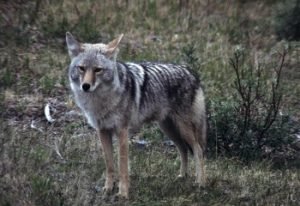 Purdue University - Extension - Forestry and Natural Resources
Purdue University - Extension - Forestry and Natural Resources
Got Nature? Blog

Coyote (Canis latrans) – Photo by Alfred Viola, Northeastern University, Bugwood.org
Question
Can you help me identify the canines that live on my farm? Are they “coyote” or “coywolf”? I have taken photos of the pups and have been confused on trying to identify them from articles I have found online. One article I found suggests a “coywolf” is something unusual; but another article I found suggests every canine we refer to in Indiana as “coyote” is actually a “coywolf” hybrid rather than a “true” coyote. I would like to know. Thank you.
Answer
Thanks for submitting this question. You are correct that many of the online articles we find are confusing and contradicting, and if I might add often just plain wrong. The truth is all coyotes east of the Mississippi River have some level of wolf genes as well as domestic dog genes. What is recent, is that this was discovered regarding wolf genes. Not because of a recent hybridization event, but that new genetic technologies (specifically, next gen sequencing) allowed researchers to detect this. Coyotes we have now are no different than they were 50 years ago. The term coywolf is a poor term at best. It is misleading and its use should be avoided. News outlets use it because it captures viewers attention.
In terms of variation in size and current hybridization, these things can happen but are very rare. The size of coyotes, as with people or any other animal species, can be extreme for a rare individual. However, the vast majority are within a normal range. Published weights of coyotes average 13 to 15 kg. So on average, coyotes in Maine are about 5 lbs heavier than those in Indiana. So, a typical adult coyote is 28 to 33 lbs, you do find one that is 40 lbs or even approaches 50 lbs total. Wolves are capable of breeding with coyotes, but they will most often run them off or kill them as competitors for shared resources. Also, we don’t have any wolves around either.
Stan Gerht is a researcher from Ohio State. His team has studied coyotes in the Chicagoland area for years. They have a lot of good information about them at the Urban Coyote Research website.
Resources
Should I Be Worried About Coyotes In My Yard?, Got Nature? Blog
Urban Coyotes – Should You Be Concerned?, Got Nature? Blog
Urban Coyote Research Center, Urban Coyote Ecology & Management, Cook County, Illinois
Dealing with Nuisance Coyotes, Indiana Department of Natural Resources (IDNR)-Fish and Wildlife
Coyotes a Constant Problem in Indy Suburbs, IndyStar
Dealing with Nuisance Coyotes, INDNR
Coyotes, Wildlife Conflicts, Department of Entomology, Purdue University
Brian MacGowan, Wildlife Extension Specialist & Extension Coordinator
Purdue University Department of Forestry and Natural Resources Extension

Recent Posts
- Report Spotted Lanternfly – Purdue Landscape Report
Posted: April 10, 2024 in Alert, Forestry, Invasive Insects, Plants, Wildlife, Woodlands - Declining Pines of the White Variety – Purdue Landscape Report
Posted: in Alert, Disease, Forestry, Plants, Wildlife, Woodlands - Are you seeing nests of our state endangered swan? – Wild Bulletin
Posted: April 9, 2024 in Alert, Forestry, How To, Wildlife - Cicadas in Spring! – Purdue Landscape Report
Posted: in Forestry, Plants, Safety, Wildlife - New Deer Impact Toolbox
Posted: April 7, 2024 in Forestry, Land Use, Plants, Publication, Safety, Wildlife, Woodlands - 2024-25 Fishing Guide now available – Wild Bulletin
Posted: April 4, 2024 in Alert, Aquaculture/Fish, Aquatic/Aquaculture Resources, How To, Ponds, Wildlife - Help Research Chronic Wasting Disease – Wild Bulletin
Posted: April 3, 2024 in Disease, Forestry, How To, Safety, Wildlife, Woodlands - Indiana Reptiles and Amphibians – IFWOA Webinar
Posted: April 1, 2024 in Forestry, How To, Webinar, Wildlife, Woodlands - Birding through the Seasons – IFWOA Webinar
Posted: in Forestry, How To, Webinar, Wildlife, Woodlands - Look Out for Invasive Carp in Your Bait Bucket – Wild Bulletin
Posted: March 31, 2024 in Alert, Aquaculture/Fish, Aquatic/Aquaculture Resources, Invasive Animal Species, Wildlife
Archives
Categories
- Alert
- Aquaculture/Fish
- Aquatic/Aquaculture Resources
- Ask the Expert
- Christmas Trees
- Community Development
- Disease
- Drought
- Forestry
- Forests and Street Trees
- Gardening
- Got Nature for Kids
- Great Lakes
- How To
- Invasive Animal Species
- Invasive Insects
- Invasive Plant Species
- Land Use
- Natural Resource Planning
- Nature of Teaching
- Plants
- Podcasts
- Ponds
- Publication
- Safety
- Timber Marketing
- Uncategorized
- Urban Forestry
- Webinar
- Wildlife
- Wood Products/Manufacturing
- Woodland Management Moment
- Woodlands